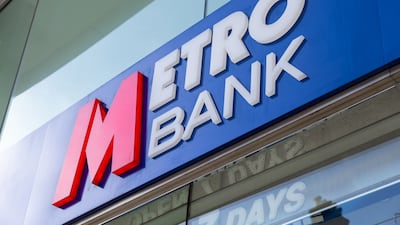The troubled British bank Metro has reached a deal that will shore-up its finances after a weekend of negotiations.
The deal includes a £325 million ($396 million) capital injection and £600 million in debt refinancing.
Spaldy Investments, which is already Metro Bank's largest shareholder, is contributing £102 million and will, once the deal is gets regulatory approval, control about 53 per cent of the bank's shares.
Spaldy, which is controlled by the Colombian billionaire Jaime Gilinski, currently owns 9.2 per cent of Metro shares.
Those shares have had a rough time lately - they fell significantly last month after regulators refused to approve a request to lower Metro's capital requirements attached to its mortgage business, and then plunged last week on the news that its finances needed shoring up.
'A new chapter'
The Bank of England's Prudential Regulation Authority, which regulates the UK's banking sector, spent the weekend sounding out potential buyers for Metro, most of whom were not interested in the business as a whole. Some were thought to be keen to buy parts of the Metro, specifically the bank's mortgage arm.

Daniel Frumkin, chief executive at Metro, said that the deal "marks a new chapter" for the bank and will lead to "continued profitable growth over the coming years".
"Our strong franchise is underpinned by our loyal customer base and engaged colleagues and we will continue to develop the Metro Bank offer to provide the digital and physical banking services our customers expect," he said.
"We thank our shareholders and noteholders for their continuing support of Metro Bank and our customers."
Meanwhile, Mr Gilinski said his increased investment was driven by a belief in "the need for physical and digital banking underpinned by a focus on exceptional customer service".
However, the deal is not without financial pain.
The shares will be heavily diluted by the £150 million equity offering of 30 pence a share, a deep discount to the 45 pence level the shares closed at on Friday.
In addition, the refinancing of £600 million worth of debt will mean that Metro will paying higher rates of interest on its borrowings.
'Northern Rocked'
"Management is calling this a new chapter for the bank, but more developments are expected to trim down its loan book and put it on a firmer footing," said Susannah Streeter, head of money and markets at Hargreaves Lansdown.
"It’s still in discussions about selling a big chunk of its mortgage book. This overall deal should help ensure the challenger bank can still expand."
But while many analysts broadly welcomed the deal, there were warnings that Metro is not entirely out of danger. Some said a future collapse along the lines of the ill-rated Northern Rock bank in 2007 was still possible.
"Metro's much-publicised problems may not be fixed by this capital raise led by its largest stakeholder," Ranald Mitchell, director at Charwin Private Clients told Newspage.
"Reputational damage will likely lead to further problems and its customers will need a lot more reassurances.
"In the worst case scenario, we could see a repeat of 2007. Metro Bank could still be Northern Rocked.”
Metro was launched in 2010, following the global financial crisis, and was the first new bank on the UK's high streets in a 100 years. It has 2.7 million customers and 76 branches across the country.


